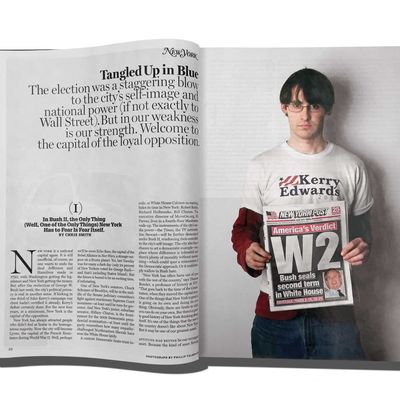
Looking back at the mood after Bush beat Kerry, and the ways our writers thought about it.
“In Bush II, the Only Thing (Well, One of the Only Things) New York Has to Fear Is Fear Itself,” by Chris Smith
Yes, last Tuesday was for many a dark day (only 24 percent of New Yorkers voted for George Bush — and that’s including Staten Island)*. But the future is bound to be an exciting time, if infuriating. One of New York’s senators, Chuck Schumer of Brooklyn, will be in the middle of the Senate judiciary committee’s fight against reactionary Supreme Court nominees — at least until he runs for governor. And New York’s junior, suburban senator, Hillary Clinton, is the front-runner for the 2008 Democratic presidential nomination — at least until the party remembers how many empathy-challenged Northeastern liberals have won the White House lately.
“The Gathering Darkness of the Blue State of Mind,” by James Atlas
On the Fifth Avenue bus, I gazed blankly out the window. The trees in Central Park were still in their vivid autumn plumage, red, yellow, and green set on fire by the early sun. I found myself thinking that what my friend Edgar, the radical novelist, calls “incremental fascism” doesn’t seem so incremental anymore. There will be a draft, and we’ll have to leave the country: No way I’m letting our 17-year-old son, Will, be sent to Iraq. They’ll drill the Alaskan tundra for oil, and the polar ice caps will melt; Manhattan will be inundated like in The Day After Tomorrow … And the Jews will be rounded up like in Philip Roth’s The Plot Against America. Did only Paul Wolfowitz stand between us and concentration camps in Kentucky? New York will be attacked again and … Wait. Maybe the guys in power want us to be attacked. What better way to get rid of all those noisome New Yorkers than to have an Al Qaeda dirty bomb explode in Grand Central at rush hour? No more need to bail out New York, because there won’t be any New York.
“MoveOn and ACT: A Movement in Search of Its Next Cause,” by Robert Kolker
New York money and sweat and political muscle played more of a role in this election than in any in recent memory — and even that wasn’t enough. George Soros and others with the means and the motive pounced on a loophole in the campaign-finance law to invent the most emotionally potent, lavishly funded, politically sophisticated campaign machine in Democratic Party history … On Election Day, the get-out-the-vote group America Coming Together actually spent twice as much as the Democratic National Committee luring voters to the polls. It was a movement, a crusade, and it didn’t exactly work. Where can it possibly go now?
“Learning to Live With a Bush Dynasty, in Five Uneasy Stages,” by Ana Marie Cox
No. 5: Acceptance. Have you exchanged your Soho House membership for one in the NRA? Has NASCAR replaced Sopranos reruns on your TiVo? Maybe William Kristol’s foreign positions are starting to sound reasonable. But remember, New York: You don’t have to go that far. Acceptance doesn’t have to be surrender. You can come to terms with Bush-Cheney II, but only as a challenge. In fact, combine your bitter politics with your Gotham obsessions. Buy Michael Moore a Coney dog. Get Eliot Spitzer moving on a suit against the Diebold company. Oh, and by all means: Kick Curt Schilling in the ankle.
“What the Democrats Missed at the Populist Revolution,” by Thomas Frank
It is almost a ritual in Washington: The Democrats are handed some stunning defeat — losing Congress, losing the presidency, losing Congress some more — and the powerful Democratic Leadership Council (DLC) holds court, comes to a verdict, and announces that the Democrats in question have lost because they foolishly clung to the party’s old, liberal, thirties identity. They remained friendly with organized labor. They didn’t understand the inevitability of free trade or the magic of the New Economy or the rise of the “wired worker.” They failed to reach out to the “center” …
Let us contrast this philosophy with the practice of the political party that causes all those disasters for Democrats, namely, the Republicans. When beaten, do they surrender their principles and flee for the center? No. Consider the Goldwater debacle of 1964 … The leaders of the New Right learned from that defeat the lessons that all successful political movements must master: They organized. They built institutions. They dreamed up hand-grenade issues designed to shatter their enemies’ coalition. And, principles intact, they came back stronger four years later to capture the presidency …
Another thing that Democrats will notice if they care to look is that [the Evangelical] constituency, made up mostly of middle- and working-class voters, is the very group that the Establishment right takes most for granted once it’s in power. The reason for this is simple: GOP leaders know that Democrats have left this huge part of the electorate with nowhere else to go. The challenge for Democrats is to provide them that place.
*In 2016, the vote — still unofficial — was 79 percent for Clinton, 18 percent for Trump.
*This article appears in the November 28, 2016, issue of New York Magazine.






























